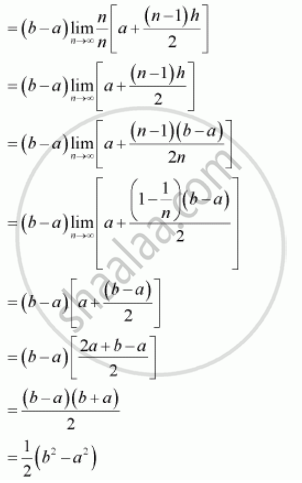Advertisements
Advertisements
Question
Evaluate the following definite integrals as limit of sums.
`int_a^b x dx`
Solution


APPEARS IN
RELATED QUESTIONS
Evaluate `int_(-1)^2(e^3x+7x-5)dx` as a limit of sums
Evaluate the following definite integrals as limit of sums.
`int_0^5 (x+1) dx`
Evaluate the following definite integrals as limit of sums.
`int_2^3 x^2 dx`
Evaluate the following definite integrals as limit of sums.
`int_1^4 (x^2 - x) dx`
Evaluate the definite integral:
`int_(pi/2)^pi e^x ((1-sinx)/(1-cos x)) dx`
Evaluate the definite integral:
`int_0^(pi/4) (sinx cos x)/(cos^4 x + sin^4 x)`dx
Evaluate the definite integral:
`int_0^(pi/2) (cos^2 x dx)/(cos^2 x + 4 sin^2 x)`
Prove the following:
`int_0^(pi/2) sin^3 xdx = 2/3`
Prove the following:
`int_0^(pi/4) 2 tan^3 xdx = 1 - log 2`
Prove the following:
`int_0^1sin^(-1) xdx = pi/2 - 1`
Evaluate `int_0^1 e^(2-3x) dx` as a limit of a sum.
`int dx/(e^x + e^(-x))` is equal to ______.
`int (cos 2x)/(sin x + cos x)^2dx` is equal to ______.
Choose the correct answers The value of `int_0^1 tan^(-1) (2x -1)/(1+x - x^2)` dx is
(A) 1
(B) 0
(C) –1
(D) `pi/4`
if `int_0^k 1/(2+ 8x^2) dx = pi/16` then the value of k is ________.
(A) `1/2`
(B) `1/3`
(C) `1/4`
(D) `1/5`
Evaluate : `int_1^3 (x^2 + 3x + e^x) dx` as the limit of the sum.
\[\int\limits_0^1 \left( x e^x + \cos\frac{\pi x}{4} \right) dx\]
Evaluate the following integral:
Evaluate the following as limit of sum:
`int _0^2 (x^2 + 3) "d"x`
Evaluate the following:
`int_0^(pi/2) (tan x)/(1 + "m"^2 tan^2x) "d"x`
Evaluate the following:
`int_0^pi x sin x cos^2x "d"x`
Evaluate the following:
`int_(pi/3)^(pi/2) sqrt(1 + cosx)/(1 - cos x)^(5/2) "d"x`
The value of `int_(-pi)^pi sin^3x cos^2x "d"x` is ______.
If f" = C, C ≠ 0, where C is a constant, then the value of `lim_(x -> 0) (f(x) - 2f (2x) + 3f (3x))/x^2` is
The limit of the function defined by `f(x) = {{:(|x|/x",", if x ≠ 0),(0",", "otherwisw"):}`
`lim_(x -> 0) (xroot(3)(z^2 - (z - x)^2))/(root(3)(8xz - 4x^2) + root(3)(8xz))^4` is equal to
Let f: (0,2)→R be defined as f(x) = `log_2(1 + tan((πx)/4))`. Then, `lim_(n→∞) 2/n(f(1/n) + f(2/n) + ... + f(1))` is equal to ______.
The value of `lim_(n→∞)1/n sum_(r = 0)^(2n-1) n^2/(n^2 + 4r^2)` is ______.
`lim_(n rightarrow ∞)1/2^n [1/sqrt(1 - 1/2^n) + 1/sqrt(1 - 2/2^n) + 1/sqrt(1 - 3/2^n) + ...... + 1/sqrt(1 - (2^n - 1)/2^n)]` is equal to ______.
